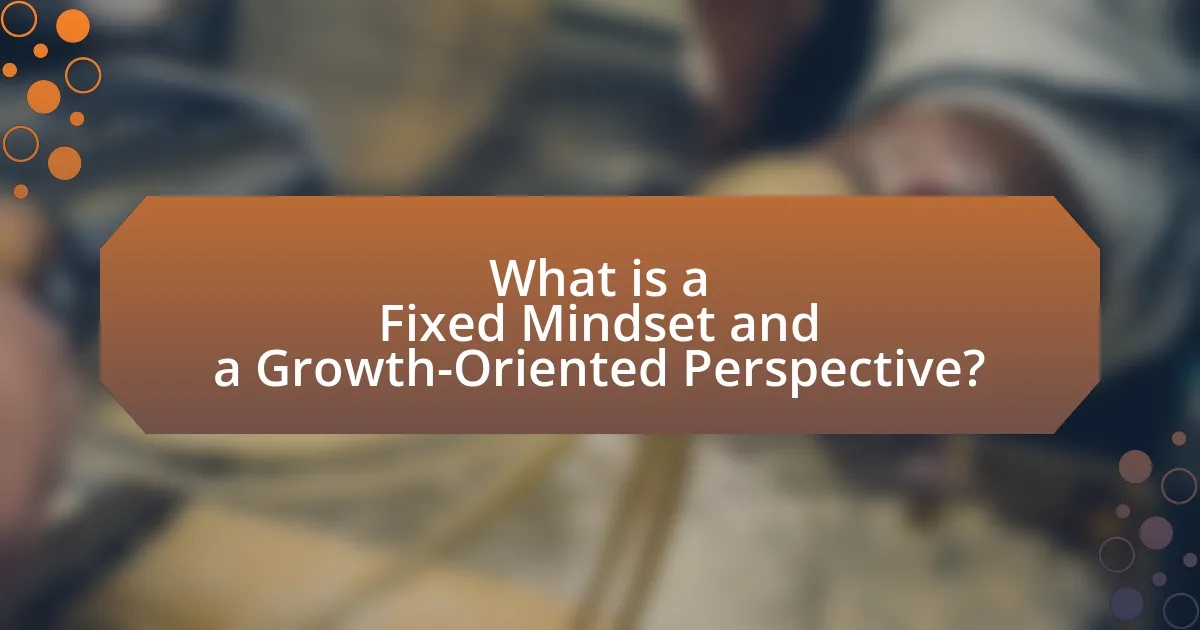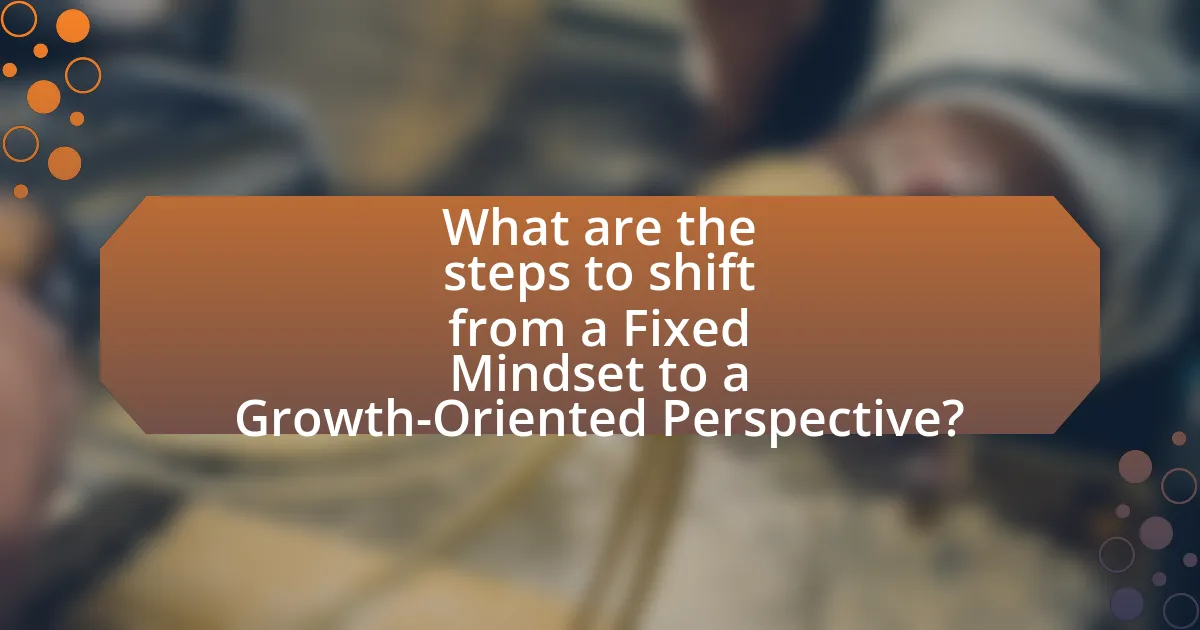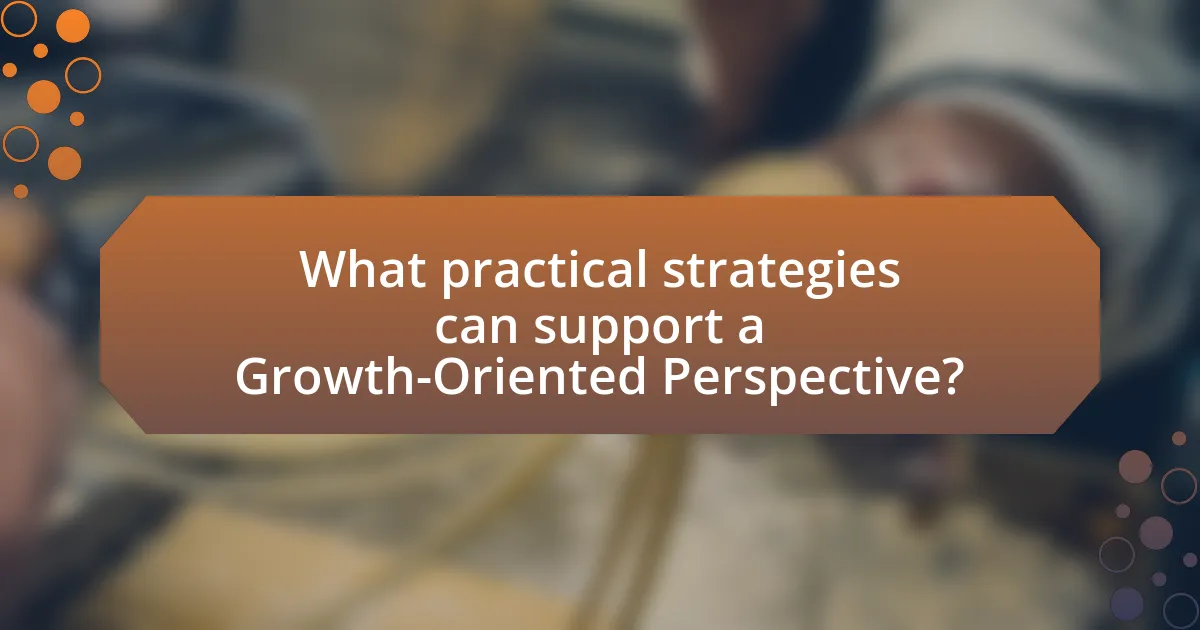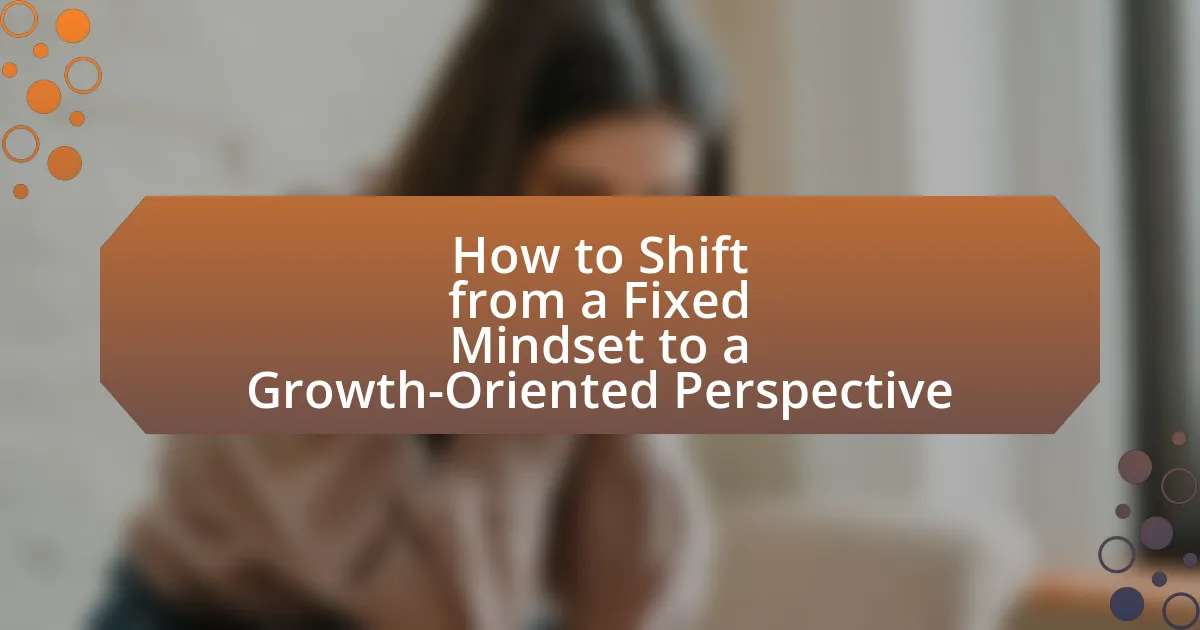The article focuses on the transition from a fixed mindset to a growth-oriented perspective, emphasizing the importance of mindset in personal development and success. It defines fixed and growth mindsets, highlighting their characteristics and the impact they have on individuals’ ability to embrace challenges and learn from failures. Key strategies for shifting mindsets include recognizing fixed beliefs, embracing challenges, enhancing self-awareness, and setting specific goals. The article also discusses practical techniques to reinforce a growth-oriented perspective, such as seeking feedback, practicing self-compassion, and utilizing positive affirmations. Overall, it provides a comprehensive framework for fostering resilience and adaptability through a growth mindset.

What is a Fixed Mindset and a Growth-Oriented Perspective?
A fixed mindset is the belief that abilities and intelligence are static traits that cannot be developed, leading individuals to avoid challenges and give up easily. In contrast, a growth-oriented perspective is the belief that abilities can be developed through dedication and hard work, fostering resilience and a love for learning. Research by psychologist Carol Dweck demonstrates that individuals with a growth mindset are more likely to embrace challenges, persist in the face of setbacks, and ultimately achieve higher levels of success.
How do fixed and growth mindsets differ?
Fixed and growth mindsets differ primarily in their beliefs about intelligence and abilities. Individuals with a fixed mindset believe that their intelligence and talents are static traits that cannot be changed, leading them to avoid challenges and give up easily when faced with obstacles. In contrast, those with a growth mindset view intelligence and abilities as qualities that can be developed through effort, learning, and persistence, which encourages them to embrace challenges and learn from failures. Research by psychologist Carol Dweck has shown that adopting a growth mindset can lead to greater achievement and resilience, as individuals are more likely to seek out opportunities for growth and improvement.
What are the characteristics of a fixed mindset?
A fixed mindset is characterized by the belief that abilities and intelligence are static traits that cannot be developed. Individuals with a fixed mindset often avoid challenges, give up easily, and view effort as fruitless. They tend to ignore feedback and feel threatened by the success of others, which can hinder personal growth and learning. Research by psychologist Carol Dweck highlights that this mindset limits potential and fosters a fear of failure, as individuals prioritize appearing smart over embracing learning opportunities.
What are the characteristics of a growth-oriented perspective?
A growth-oriented perspective is characterized by a belief in the ability to develop skills and intelligence through effort and learning. Individuals with this perspective embrace challenges, view failures as opportunities for growth, and are motivated by the success of others. They prioritize continuous improvement and resilience, often seeking feedback to enhance their performance. Research by Dweck (2006) in “Mindset: The New Psychology of Success” supports these characteristics, demonstrating that individuals with a growth mindset achieve higher levels of success due to their adaptive approach to learning and challenges.
Why is it important to shift from a fixed mindset to a growth-oriented perspective?
Shifting from a fixed mindset to a growth-oriented perspective is important because it fosters resilience and adaptability in individuals. A growth mindset encourages the belief that abilities and intelligence can be developed through dedication and hard work, leading to greater motivation and achievement. Research by Carol Dweck, a psychologist at Stanford University, demonstrates that individuals with a growth mindset are more likely to embrace challenges, persist in the face of setbacks, and ultimately achieve higher levels of success compared to those with a fixed mindset, who may avoid challenges due to fear of failure. This shift not only enhances personal development but also contributes to improved performance in educational and professional settings.
What impact does mindset have on personal development?
Mindset significantly influences personal development by shaping how individuals perceive challenges and opportunities for growth. A growth mindset, characterized by the belief that abilities can be developed through dedication and hard work, fosters resilience and a willingness to learn from failures. Research by Carol Dweck, a psychologist at Stanford University, demonstrates that individuals with a growth mindset are more likely to embrace challenges, persist in the face of setbacks, and ultimately achieve higher levels of success compared to those with a fixed mindset, who may view their abilities as static and avoid challenges. This evidence underscores the critical role mindset plays in facilitating personal growth and development.
How does mindset influence success and achievement?
Mindset significantly influences success and achievement by shaping how individuals approach challenges and perceive their abilities. A growth mindset, characterized by the belief that skills and intelligence can be developed, leads to greater resilience, persistence, and a willingness to learn from failures. Research by Carol Dweck, a psychologist at Stanford University, demonstrates that individuals with a growth mindset are more likely to embrace challenges and achieve higher levels of success compared to those with a fixed mindset, who believe their abilities are static. This correlation is supported by studies showing that students with a growth mindset perform better academically, as they are more likely to seek out feedback and improve over time.

What are the steps to shift from a Fixed Mindset to a Growth-Oriented Perspective?
To shift from a Fixed Mindset to a Growth-Oriented Perspective, individuals should first recognize and acknowledge their fixed beliefs about abilities and intelligence. This awareness allows them to challenge these beliefs actively. Next, they should embrace challenges as opportunities for growth rather than obstacles. Engaging in self-reflection and seeking feedback can further enhance their understanding of personal development. Additionally, cultivating a love for learning and persistence in the face of setbacks reinforces a growth mindset. Research by Carol Dweck, a psychologist at Stanford University, supports these steps, demonstrating that individuals who adopt a growth mindset are more likely to achieve higher levels of success and resilience.
How can self-awareness facilitate this shift?
Self-awareness can facilitate the shift from a fixed mindset to a growth-oriented perspective by enabling individuals to recognize their own thought patterns and limitations. This recognition allows individuals to identify fixed beliefs that hinder their growth, such as the fear of failure or the belief that intelligence is static. Research indicates that self-awareness enhances emotional regulation and promotes adaptive coping strategies, which are essential for embracing challenges and learning from feedback. For example, a study published in the Journal of Personality and Social Psychology found that individuals with higher self-awareness are more likely to seek out constructive criticism and view setbacks as opportunities for growth. Thus, self-awareness serves as a critical tool in fostering a mindset that values learning and resilience.
What techniques can enhance self-awareness?
Techniques that can enhance self-awareness include mindfulness meditation, journaling, and seeking feedback from others. Mindfulness meditation allows individuals to observe their thoughts and feelings without judgment, fostering a deeper understanding of their internal states. Research published in the journal “Psychological Science” by Zeidan et al. (2010) indicates that mindfulness practices can significantly improve self-awareness and emotional regulation. Journaling encourages reflection on personal experiences and emotions, which can clarify thoughts and promote self-discovery. A study in the “Journal of Experimental Psychology” by Pennebaker and Chung (2011) supports the idea that expressive writing enhances self-awareness by helping individuals process their emotions. Lastly, seeking feedback from trusted peers or mentors provides external perspectives that can reveal blind spots and promote growth, as highlighted in a study by London and Smither (1999) in the “Journal of Applied Psychology,” which found that feedback significantly contributes to self-awareness development.
How does recognizing fixed mindset triggers help in the transition?
Recognizing fixed mindset triggers facilitates the transition to a growth-oriented perspective by enabling individuals to identify and address limiting beliefs. When individuals become aware of specific situations or thoughts that prompt a fixed mindset, they can consciously challenge these beliefs and replace them with growth-oriented alternatives. Research by Carol Dweck, a leading psychologist in mindset theory, indicates that awareness of these triggers allows for proactive strategies to foster resilience and adaptability, ultimately leading to improved learning and personal development.
What role does embracing challenges play in this process?
Embracing challenges is essential in shifting from a fixed mindset to a growth-oriented perspective, as it fosters resilience and adaptability. When individuals confront difficulties, they develop problem-solving skills and learn to view setbacks as opportunities for growth. Research by Carol Dweck, a psychologist known for her work on mindset, indicates that those who embrace challenges are more likely to achieve higher levels of success and personal development. This is because facing challenges encourages a learning process that enhances self-efficacy and motivation, ultimately leading to a more dynamic and flexible approach to personal and professional growth.
How can one develop a willingness to take risks?
To develop a willingness to take risks, one must cultivate a growth mindset that embraces challenges and views failures as learning opportunities. Research by Carol Dweck highlights that individuals with a growth mindset are more likely to take risks because they believe their abilities can be developed through effort and perseverance. Engaging in small, manageable risks can build confidence and gradually increase tolerance for larger risks. Additionally, reflecting on past experiences where taking risks led to positive outcomes reinforces the belief that risk-taking can be beneficial.
What strategies can help in overcoming fear of failure?
To overcome fear of failure, individuals can adopt strategies such as reframing failure as a learning opportunity, setting realistic goals, and practicing self-compassion. Reframing failure allows individuals to view setbacks as essential steps in the learning process, which aligns with research indicating that a growth mindset fosters resilience and adaptability. Setting realistic goals helps to reduce the pressure associated with high expectations, making it easier to take risks without the paralyzing fear of failure. Practicing self-compassion involves treating oneself with kindness during setbacks, which has been shown to enhance emotional resilience and reduce anxiety related to performance. These strategies collectively contribute to a shift from a fixed mindset to a growth-oriented perspective, enabling individuals to embrace challenges and learn from their experiences.

What practical strategies can support a Growth-Oriented Perspective?
Practical strategies that can support a Growth-Oriented Perspective include embracing challenges, seeking feedback, and fostering a culture of learning. Embracing challenges encourages individuals to step outside their comfort zones, which research shows leads to greater resilience and adaptability (Dweck, 2006). Seeking feedback allows for continuous improvement and helps individuals identify areas for growth, reinforcing the idea that abilities can be developed over time. Additionally, fostering a culture of learning within teams or organizations promotes collaboration and innovation, as it encourages individuals to share knowledge and learn from one another. These strategies collectively contribute to a mindset that values effort and persistence, essential components of a growth-oriented perspective.
How can setting goals contribute to a growth mindset?
Setting goals fosters a growth mindset by providing clear objectives that encourage individuals to embrace challenges and learn from failures. When people set specific, measurable, achievable, relevant, and time-bound (SMART) goals, they create a roadmap for personal development, which reinforces the belief that abilities can be developed through effort and perseverance. Research by Dweck (2006) highlights that individuals who set goals are more likely to adopt a growth mindset, as they view setbacks as opportunities for learning rather than as indicators of their limitations. This process of goal-setting and achievement cultivates resilience and a proactive approach to personal growth.
What types of goals are most effective for fostering growth?
Specific, measurable, achievable, relevant, and time-bound (SMART) goals are most effective for fostering growth. These goals provide clear direction and benchmarks for progress, which are essential for individuals transitioning from a fixed mindset to a growth-oriented perspective. Research indicates that setting SMART goals enhances motivation and accountability, leading to improved performance and personal development. For instance, a study published in the Journal of Applied Psychology found that individuals who set specific and challenging goals performed better than those who set vague or easy goals, demonstrating the effectiveness of structured goal-setting in promoting growth.
How can one track progress towards these goals?
One can track progress towards goals by setting specific, measurable milestones and regularly reviewing them. This approach allows individuals to assess their advancement in adopting a growth-oriented perspective, as evidenced by research indicating that goal-setting enhances motivation and accountability. For instance, a study published in the American Journal of Lifestyle Medicine found that individuals who set clear goals and monitored their progress were more likely to achieve desired outcomes, demonstrating the effectiveness of this method in fostering a growth mindset.
What are some daily practices to reinforce a growth-oriented perspective?
Daily practices to reinforce a growth-oriented perspective include setting specific learning goals, embracing challenges, and reflecting on experiences. Setting specific learning goals helps individuals focus on areas for improvement, fostering a mindset that values progress over perfection. Embracing challenges encourages individuals to step outside their comfort zones, which research shows can enhance resilience and adaptability. Reflecting on experiences, such as journaling about successes and failures, allows individuals to analyze their growth and learn from mistakes, reinforcing the belief that abilities can be developed through effort and persistence. These practices collectively contribute to a sustained growth mindset, supported by studies indicating that individuals who engage in such behaviors are more likely to achieve long-term success and personal development.
How can positive affirmations and self-talk aid in this shift?
Positive affirmations and self-talk can significantly aid in shifting from a fixed mindset to a growth-oriented perspective by reinforcing self-belief and encouraging resilience. Research indicates that positive affirmations can activate brain regions associated with self-related processing and reward, which enhances motivation and promotes a willingness to embrace challenges. For instance, a study published in the journal “Psychological Science” by Cohen et al. (2006) demonstrated that individuals who practiced self-affirmation showed improved problem-solving abilities and greater openness to feedback. This suggests that positive self-talk can help individuals reframe their thoughts, reduce anxiety, and foster a more adaptive approach to learning and personal development.
What role does seeking feedback play in personal growth?
Seeking feedback is essential for personal growth as it provides individuals with insights into their strengths and areas for improvement. By actively soliciting feedback, individuals can identify blind spots in their self-perception and gain a clearer understanding of their performance. Research indicates that feedback can enhance learning and development; for instance, a study published in the Journal of Applied Psychology found that individuals who seek feedback are more likely to achieve their goals and improve their skills over time. This process fosters a growth-oriented mindset, encouraging continuous learning and adaptation.
What are common challenges faced when shifting mindsets and how can they be overcome?
Common challenges faced when shifting mindsets include resistance to change, fear of failure, and lack of self-efficacy. Resistance to change often stems from comfort with existing beliefs and practices, making individuals hesitant to adopt new perspectives. Fear of failure can inhibit risk-taking and experimentation, essential components of a growth-oriented mindset. Lack of self-efficacy, or belief in one’s ability to succeed, can further discourage individuals from pursuing growth opportunities.
These challenges can be overcome through targeted strategies. To address resistance to change, fostering an environment that encourages open dialogue and exploration of new ideas can help individuals feel more comfortable with the transition. Implementing small, manageable changes can also ease the process. To combat fear of failure, promoting a culture that views mistakes as learning opportunities rather than setbacks can encourage risk-taking. Lastly, enhancing self-efficacy can be achieved through setting achievable goals, providing constructive feedback, and celebrating small successes, which collectively build confidence in one’s abilities.
